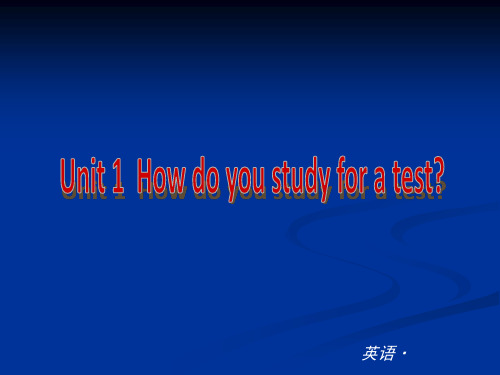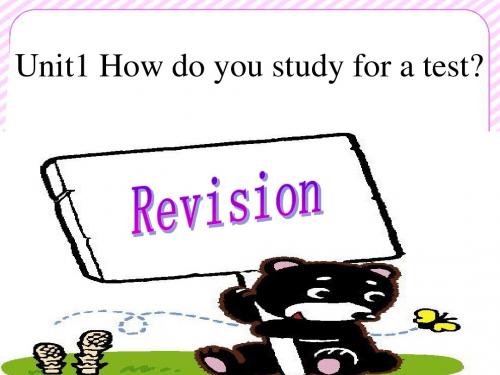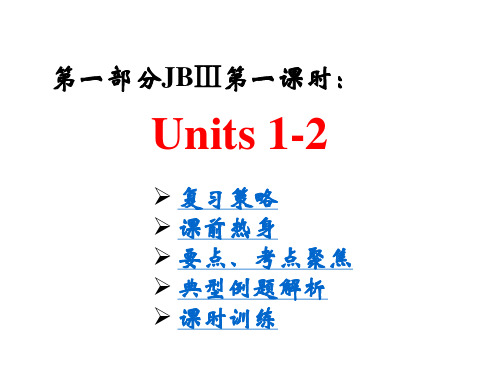九年级英语人教版(新目标)期末复习(一)
新目标九年级英语期末复习1--3单元

英语·新课标(RJ)
Unit 1 ┃ 能力提升训练
┃能力提升训练┃
Ⅰ.单项填空 ( D )1. —Will you please show me how to do the roleplay exercise? —Sure. Now let me tell you ________ first. A.which to do C.when to do —By________email. A.How; sending C.What; sending B.How; send D.What; send B.how to do D.what to do
18.写下;记下________________________ Write down
19.把„„看作 ________________ regard…as 20.在„„的帮助下____________________ with the help of
英语·新课标(RJ)
Unit 1 ┃ 基础知识梳理 ● 巩固应用
4.They ____________(中断) a friendship of twenty years‘ broke off
standing. 5.You should learn how to ______________(处理) your problems. deal with try your best 6.You should ________________(尽力) to do the work well.
英语·新课标(RJ)
Unit 1 ┃ 能力提升训练
( D )14. No matter what happens, the doctors will do ________ best ________ the sick person. A.they; help C.their; help B.they; to help D.their; to help
新版新目标九年级期末复习单选题unit1-3

Unit 1 How can we become good learners?1.–Are you going to see the film with us?—No, thanks. I ______it already.A.have seenB. sawC. seeD. was seeing2.–How do you study math?--I study ______the teacher______help.A. in asking, forB. by ask, forC. by asking, forD. with asking, about3. It’s a fine day. What about_______?A. go hikingB. go to hikeC. going hikingD. going to hiking4. The question is ______hard______ answer.A. too, toB. so, thatC. very, toD. enough, to5. _______in the sun ______bad for your eyes.A. Read, isB. To read, areC. Reading, areD. Reading, is6. ---I don’t know the words, what should I do?---You could ______ in your dictionary.A.look up itB. look them upC. find itD. find it out7. Is there ______in the newspaper?A. anything importantB. something importantC. some important thingD. important anything8. He always makes mistakes _______ grammar.A. forB. inC. aboutD. as9. Tina found ______ a foreign language.A. it easy to learnB. it’s easy to learnC. is easy learnD. it easy learn10. ---______did you tell her about the news?---By sending an e-mail.A.WhatB. WhyC. WhenD. How11. He practices______ English every day in order to improve his ______English.A. speaking, speakingB. spoken, speakingC. speaking, spokenD. spoken, spoken12. We will ______ the city football club. Would you like______us?A. join, to joinB. join, take part inC. take part in, joinD. join, to take part in13. ----I have trouble ______my new computer.----Don’t worry. I’ll show you how______it.A. using, usingB. to use, to useC. using, to useD. to use, using14. ----Children, you should remember: ______careful you are, ______ mistakes you will make.----We know, Mrs. White.A. The more, the moreB. The fewer, the moreC. The more, the fewerD. The more, the less15. Why don’t you______ your teacher for help when you can’t finish ______it by yourself?A. ask, writeB. to ask, writingC. ask, writingD. asking, write16.Some students are afraid ______ mistakes when learning English.A. to makeB. makingC. of makeD. made17. ______ students didn’t go to school and stayed at home yesterday ______ the heavy rain.A. Hundreds of, becauseB. Hundred of, because ofC. Hundred, because ofD. Hundreds of, because of18. Shanghai is very beautiful and I ______it.A. fall in love withB. fall in like wihC. fall in love inD. fell in love with19. I listened to the song ______many times ______ I could recite the lyrics.A. such, thatB. very, thatC. so, thatD. so, so20. Our teacher often makes us______ English words.A. pay attention to pronounceB. to pay attention to pronounceC. pay attention to pronouncingD. to pay attention to pronouncing21. You had better get a doctor _______ your bad tooth.A. pull outB. to pull outC. pulled outD. pulling out22. The government has decided _______ the telephone lines _______ to every village.A. having, connectingB. having, to connectC. to have, connectedD. to have, to connectUnit 2 I think that mooncakes are delicious!1.Look at the smog. _______ bad whether it is!A.HowB. How aC. WhatD. What a2.----Could you tell me _______in your hometown in winter? ----Sure.A.whether does it often snowB. whether it often snowsC. if it often snowD. if does it snow3. I hear our teacher will be back _______ three weeks’ time.A. atB. inC. forD. on4. ----_______fine day it is today!----Yes, the sunshine is _______ beautiful that I’d like to go swimming in the sea.A.How, suchB. What a, veryC. How, soD. What a, so5. We plan _______ to Liu Huan’s concert, but it’s rainy today.A. listenB. to listenC. listeningD. listened6. ----Do you know _______ tomorrow?---- Sorry, I don’t know. You may surf the Internet.A.whether will it rainB. if it will rainC. whether does it rainD. if will it rain7. ----Has Mary been back?---- Not yet. She will come back ______ the evening of June ______.A.at, firstB. to, thirtiethC. on, the twelfthD. on, the nineteen8.----I think it’s fun _______ on the moon.----- I think so, too.A. walkB. to walkC. walkingD. to walking9. Action movies ______ me of Jackie Chan.A. remindB. thinkC. hearD. miss10. ----What did the doctor say? ----He ______ me not to eat too much candy.A. suggestedB. warnedC. allowedD. stopped11. His uncle ______ for driving after drinking.A. punishB. punishesC. was punishedD. punished12.How _______ he is! He is always acting _______. He is really a _______.A. foolish, foolishly, foolB. fool, foolish, foolC. foolish, fool, foolD. fool, foolishly, fool13. ----Which dress do you like best, Madam?---- Sorry, I can’t decide ______now.A.to buy which oneB. buy which oneC. which one to buyD. which I should buy it14. Her sister ______ in bed all day because she had a high fever.A. layB. lieC. laidD. lain15. Teacher said that the earth _______ round the sun.A. moveB. movedC. movesD. moving16. I don’t know ______ he will come tomorrow. _______he comes, I will tell you.A. if, WhetherB. whether, WhetherC. if, ThatD. if, If17. I don’t like people ______ only care about themselves.A. whatB. whichC. whoD. whether18.If you don’t work hard, you might _______failing the exam.A. end upB. get upC. look upD. put up19. In some countries, people try to play tricks _______ each other on April Fool’s Day.A. withB. atC. onD. to20.In fact, there are many ways _______ our love to our parents.A. showB. showsC. showingD. to show21.----Do you know Luc y’s grandma?----Of course. She is a kind woman, but she has _______ for about a month since she _______ in the accident.A.been dead, was killedB. died, was killedC. been dead, killedD. died, killed Unit 3 Could you please tell me where the restrooms are?1. ----Do you know _______ this evening?----At 6:00 p.m.A.when does the party startB. when the party startsC.where is the partyD. where the party is2. The language you use depends _______ the relationship and situation.A. inB. onC. atD. for3. It sounds more _______ to say, “ Could you please tell me how to get to the station?”A. directB. politeC. politelyD. impolite4.---- Could you tell me_______? ----Just go straight. It’s on your right.A. where the airport isB. where is the airportC. how can I get to the airportD. where the airport was5. ----Do you know _______ the iPhone 4? ----Maybe over four thousand yuan. I’m not quite sure.A. how much did she pay forB. how much will she pay forC. how much she paid forD. why she paid for6. The teacher asked the boy _______.A. why he is lateB. why he was lateC. where was he lateD. how was he late7. Some supermarkets open ____ 8 a.m. and 8:30 p.m. _____ Mid-Autumn Festival.A. at, duringB. between, onC. between, inD. about, on8. It was a sunny afternoon and so I suggested _______ to the beach.A. goingB. to goC. goD. having gone9. ________ that they haven’t known the news.A. It seemsB. It seemedC. they seemD. They seemed10. Walk along this street, and you’ll see the hospital _______ your left.A. inB. pastC. onD. over11. ----Do you like this song, Martin? ----Yes. It_______ beautiful.A. hearsB. soundsC. looksD. listens12. ----Why did you go to the library? ---- _______ something more about Lu Xun.A. To learnB. LearningC. To be learntD. Learnt13. ----Could you please tell me _______ to the post office, please?---- Yes. It’s down Bridge Street on your right.A.how I gotB. how I can getC. how can I getD. how did I get14. Can you tell me _______ she is looking for?A. thatB. whoseC. whatD. which15. ----Can I help you?----Yes. I’d like a ticket to Mount Emei. Can you tell me ______take to get there?A.how soon will itB. how soon it willC. how long it willD. how long will it16. My friend asked me _______.A. who is the girlB. who the girl wasC. who was the girlD. who the girl is17. I don’t know _______ he will come tomorrow.A. ifB. whetherC. whatD. both A and B18. We would like you _______ and we look forward _______you.A. to come, to seeB. come, to seeingC. come, to seeD. to come, to seeing19. ----Is there a No.2 bus stop near here ?----Yes, there is. _______ at the second crossing, and you will find it.A.Turning leftB. Turn leftC. To turn leftD. Turns left20. Could you tell me where _______ the hospital?A. to findB. can I findC. how to findD. find21. A direct order like “Daisy, pass me the book.”Sounds rude. We’d better say: “_______”A. Daisy, could you please pass me the book?B. Daisy, I wonder if you can pass me the book.C. Daisy, give me the book!D. Daisy, I wonder you can pass me the book.22. They are good friends. _______ is no wonder that they know each other so well.A. ThisB. ThatC. ThereD. It答案:Unit 11-5 ACCAD 6-10BABAD 11-15 CACCC 16-20 ADACC 21-22 BC Unit 21-5 CBBDB 6-10 BCBAB 11-15 CACAC 16-20 DCACD 21 AUnit 31-5 BBBAC 6-10 BBAAC 11-15 BABCC 16-20 BDDBA 21-22 AD。
新目标英语九年级综合复习题(一)

综合复习题(一)(满分:100分)新目标英语九年级新目标英语九年级综合复习题(一)(第1页,共8页)知识运用(两部分,共20小题,每小题1分,计20分)A )语法填空从A 、B 、C 三个选项中选择最佳答案填空。
(共10小题,每小题1分)()1.—Do you still play basketball?—Oh,no.I _______it for the past two years.A.haven ’t playedB.didn ’t playC.won ’t play ()2.—What are you doing?—I ’m looking _______the kids.They should be back for lunch now.A.afterB.atC.for ()3.—Is 1,000dollars enough for our trip?—Just to be on the _______side,let ’s take more money than we think we ’ll need.A.safeB.simpleC.similar ()4.—The name of the shop is out of fashion.—Don ’t be _______by its name.The bags and shoes it sells are very popular.A.movedB.controlledC.fooled ()5.—The world famous British(物理学家)Stephen Hawking died on March 14at the age of 76.—It _______be a big (损失)to his family and the world.A.willB.mustC.need ()6.Alice was silent during the early part of the discussion but finally she gave _______to her opinion on the subject.A.voice B.way C.ear ()7.—How about 7o ’clock outside the cinema?—That _______me fine.A.matchesB.satisfiesC.suits ()8.—For all these years you have been working for him.You need to plan for the future.—Yes.I ’m hoping I ’ll _______my own business someday.A.turn upB.set upC.pick up 46新目标英语九年级综合复习题(一)(第2页,共8页)()9.—Have you found a job yet?—No.I ’ve got two job offers,but I feel I would accept _______.A.eitherB.noneC.neither ()10.—Oh,my dear.Your shoes and clothes are wet through.—You can ’t imagine _______on such a windy and rainy night.A.what have I doneB.why did I go outsideC.where I have beenB )完形填空阅读短文,掌握其大意,从每题所给的A 、B 、C 三个选项中选择最佳答案填空。
人教新目标英语九年级上册期末复习选词填空专题(附答案)

人教新目标英语九年级上册期末复习选词填空专题(附答案)1.从方框中选择单词,并用其正确形式填空。
每词限用一次。
Angela Clayton is a 20-year-old costume designer. She is from Long Island, New York. At the________ of 14, she became interested in ________ things. She watched some movies and shows. She ________ in love with the beautiful dresses in them. Then she tried to________ sewing(缝纫).The first thing Angela sewed was a school uniform. It________her about two months to finish sewing the school uniform. One day, she put on her new school ________ and went to school. All her classmates liked her school uniform.Then she started to make new dresses. She liked the cartoon characters, Elsa and Merida. She________ about 250 hours finishing the new dresses. What a ________ time! But Angela didn't ________ tired. She said, "I love making costumes and I spend hours sewing every day. If I'm not sewing, I'm probably thinking about sewing."Angela Clayton has a big ________. She dreams of using her own dresses to have a fashion show.2.根据短文内容,用方框中所给单词的适当形式填空,每词限用一次。
九年级英语新目标unit1_复习课件

1.学习英语最好的方法 2.在小组内学习 3.通过听录音带 4.读教科书 5.制作词汇卡 6.看英语语言录像 7.朗读 8.练习发音 9.以那种方式学到很多 10. 太难以致不能听懂 发音.
1.将…变为… 3.在…的帮助下 4.考虑,想到 5.把…和…相比 8.中止,中断友谊 9.学会忘记 10. 更糟糕的事情
change…into… with the help of… think of… compare…with/to… break off a friendship learn to forget something worse
Unit 1 ┃ 基础知识梳理
10.尽力做……_______________best try one's 11.突然中止;中断______________ break off
12.参加小组学习________________ a study with
group 13.因……很兴奋(很激动)____________________ about sth. be/get excited 14.以……而告终________________ end up doing sth do/make a __ 15.做关于……的调查_________________survey 16.犯错误_make mistakes _______________ 17.在……方面有困难_________________________ have difficulty/trouble in doing st 18.写下;记下________________________ write down 19.把……看作 ________________ regard…as 20.在……的帮助下____________________ of with the help
人教版九年级英语全一册总复习PPT课件

-
1
unit1 u Exercise2 Exercise3 Exercise1 Exercise2 Exercise3 Exercise1 Exercise1 Exercise1
unit2 unit4 unit6
-
Exercise1 Exercise2 Exercise3 Exercise1 Exercise1 Exercise1 Exercise1 Exercise1 Exercise1
C. generous
D. shy
( ) 2. —Do you know who C America, Andy?
2
unit7
unit9 unit11
九年级英语总复习目录
Exercise1
Exercise2
unit8
Exercise3
unit1-7词汇复习1
unit1-7词汇复习2
unit1-7语法练习
unit1-7交际用语练习
Exercise1
Exercise2
unit10
Exercise3
Exercise1
17. 一点一点地
18. 代替;而不是
19. 为……做准备
20. 一次又一次
11. have… in common 12. pay attention to 13. connect… with… 14.
explain sth to sb
15. find out 16. on one’s own 17. bit by bit 18. instead of
19. prepare for… 20. over and over again
-
7
【学以致用】 根据句意及汉语提示,填写适当的短
强力推荐 新课标新目标九年级英语期末复习

year round.
11.一位21岁的小伙子,在一年前放弃了他在旧金山图书馆的工作。
A 21 year old man, gave up his job in the San Francisco library a year ago.
12.在2001年5月17日,他13岁生日的那一天,他的梦想变成了现实。 On May 17,2001,his 13th birthday,his dream came true
要点、考点聚焦
7.What happens指发生某种事情,会怎么处理,可用一
般过去时、一般现在时、一般将来时及现在完成时。注意: happen一词不用被动语态,而另一词“take place"也作 “发生”解,但可以用于被动语态。
8.
borrow 借 对于动词的主语来说是“借进”时。 lend 借 对于动词的主语来说是“借出”时。 keep 借 指所借的东西要保留一段时间。 used to do sth.过去常常干某事,否定式结构为 “usedn't to do sth." be used to doing sth.习惯于做某事,“to”为介词。 be used to do sth.被用于做某事,为被动语态结构, “to”为动词不定式标志。
What was worse,Grandma lost more books.
4.她很着急,图书管理员也是一样。 She was worried and so was the librarian.
5.恐怕我得赔偿丢失的书了。 I'm afraid I'll have to pay for the lost books.
第一部分JBⅢ第一课时:
中考(九年级)英语期末复习手册

新目标九年级英语期末复习手册Unit1-10重点知识梳理Unit 1一:知识点1.Check in : 在旅馆的登记入住。
Check out: 在旅馆结账离开。
2.By: ①通过…..方式(途径)。
例:I learn English by listening to tapes.②在…..旁边。
例:by the window/the door③乘坐交通工具例:by bus/car④在……之前,到……为止。
例:by October在10月前⑤被例:English is spoken by many people.3.how与what的区别:how通常对方式或程度提问,意思有:怎么样如何,通常用来做状语、表语。
what通常对动作的发出者或接受者提问,意思为什么,通常做宾语,主语。
How is your summer holiday? It’s OK.(how表示程度做表语)How did you travel around the world? I travel by air.What do you learn at school? I learn English, math and many oth er subjects.4.aloud, loud ,loudly 均可做副词。
aloud 出声地大声地多与read 、speak连用例如:read aloud 朗读 speak aloud说出声来loud 大声地响亮地 loudly 高声地多指喧闹声和不悦耳的声音。
5. voice 指人的嗓音也指鸟鸣。
sound 指人可以听到的各种声音。
no ise 指噪音、吵闹声6. find + 宾语 + 宾补(名词形容词介词短语分词等)例:I find him friendly. I found him working i n the garden.We found him in bed. He found the windo w closed.7. 常见的系动词有:①是:am 、is、 are ②保持:keep、 st ay③ 转变:become、 get、 turn ④ ……起来 feel、 look、 smell、taste、 sound8. get + 宾语 + 宾补(形容词过去分词动词不定式)使某种情况发生例:Get the shoes clean. 把鞋擦干净 Get Mr. Green to come. 让格林先生进来I want to get my bike repaired. 我想去修自行车You can’t get him waiting. 你不能让他老等着9. 动词不定式做定语①与所修饰的名词构成主谓关系The next train to arrive was from New York. He is always the firs t to come.②与所修饰的名词构成动宾关系I have nothing to say. I need a pen t o write with.I need some paper to write on. I don’t have a room t o live in.10. practice , fun 做名词为不可数名词 11. a dd 补充说又说12. join 加入某团体并成为其中一员 attend 出席参加会议或讲座join in与take part in指参加到某项活动中去。
- 1、下载文档前请自行甄别文档内容的完整性,平台不提供额外的编辑、内容补充、找答案等附加服务。
- 2、"仅部分预览"的文档,不可在线预览部分如存在完整性等问题,可反馈申请退款(可完整预览的文档不适用该条件!)。
- 3、如文档侵犯您的权益,请联系客服反馈,我们会尽快为您处理(人工客服工作时间:9:00-18:30)。
【本讲教育信息】一. 教学内容:期末复习基础知识(一)二. 教学过程【重要内容概要】1. 现在完成时。
2. 一般现在时和一般过去时的被动语态。
3. 宾语从句。
4. 使役动词make的用法。
5. 动词不定式的用法。
【知识精讲】重点句式讲解1. Could you tell me how to get to the post office?请告诉我怎样才能到邮局好吗?句中Could you tell me 后接带疑问词的不定式作宾语,语意上相当于how 引导的特殊疑问句。
此处how to get to the post office相当于How can I get to the post office? 类似的结构如下:⊙Can you tell me when to start? →Can you tell me when we will start?你能告诉我什么时候出发吗?⊙Could you tell me which to choose? →Could you tell me which one I should choose?你能告诉我我应该选哪个吗?【知识拓展】不定式与疑问词who, which, when, where, how, what 等连用,在句中可充当主语、表语、宾语等。
例如:He didn’t know what to say. 他不知道说什么。
(作宾语)How to solve the problem is very important. 怎样解决这个问题非常重要。
(作主语)My question is when to start. 我的问题是什么时候出发。
(作表语)不定式与why 连用时,只用于why 或why not开头的简短疑问句中,后面紧跟的动词不定式不带to。
例如:Why not help your mom make dinner? 为什么不帮你妈妈做饭呢?Why argue with him? 为什么和他争论呢?2. Is that a good place to hang out? 那是闲逛的好地方吗?动词不定式短语to hang out作a good place的后置定语。
【知识拓展】不定式作定语与所修饰的名词之间有如下几种关系:⑴动宾关系。
这是不定式作定语的一种常见形式,即:不定式所修饰的名词/代词是不定式的逻辑宾语。
例如:He has too many things to do. 他要做的事太多了。
I have nothing to say on this question. 在这个问题上,我没有什么话要说。
此时不定式也可以是“不定式+介词”结构,这里的介词一般不可省去。
如:Give me some paper to write on. 给我一些用来写字的纸。
He can find no one to make friends with. 他找不到一个可以交朋友的人。
⑵主谓关系。
不定式所修饰的名词/代词是不定式的逻辑主语。
例如:He was the first boy to work out the problem. 他是第一个算出这道题的男孩。
She was the only one to grow up. 她是唯一成活的。
⑶所属/修饰关系。
不定式与所修饰的名词之间是所属关系。
例如:Li Mei is on her way to see a film. 李梅在去看电影的路上。
(不是在去作别的事情的路上,而是在去看电影的路上。
)3. I find stamps fascinating. 我发现邮票令人着迷。
fascinating 在此用作find 的宾语补足语。
作及物动词“找到;发现”时,其后可直接跟名词、代词作宾语,可接宾语从句,也可接复合宾语(即宾语+宾补);其宾补可由现在分词、过去分词、形容词、副词、名词和介词短语来充当。
例如:We found him waiting to receive us. 我们发现他正在那儿接我们。
(现在分词作宾补)He found the door closed. 他发现门关着。
(过去分词作宾补)I found those books ( to be ) very interesting. 我发现那些书很有趣。
(find的宾补一般不用不定式,但可用to be,且常省略。
)We went to her house but we found her out. 我们去她家,但发现她出去了。
(副词作宾补)You’ll find it a difficult book. 你会发现这本书很难。
(名词作宾补)The worker found the machine out of order. 这位工人发现机器出了毛病。
(介词短语作宾补)4. I have to say, I find it difficult to remember everything. 我不得不说,我发现记住这一切是困难的。
句中it作find的形式宾语,find的真正的宾语是不定式短语to remember everything;形容词difficult为宾语补足语。
例如:I found it difficult to finish the task in time. 我发现要及时完成这项任务很难。
【知识拓展】it 作形式宾语的用法:it 作形式宾语用于“动词(feel, think, find, consider, make)+ it + 宾语补足语(形容词,名词)+ 不定式/动名词/从句”的结构,即feel / think等这些动词以不定式、动名词、从句作宾语,而且以形容词、名词充当宾语补足语时,一般需采用以it充当形式宾语的结构,而将真正的宾语放于宾补之后。
例如:We consider it necessary to combine theory with practice.我们认为理论联系实际是必要的。
We think it useless learning a theory without practice.我们认为学习理论而没有实践是无用的。
The teacher made it a rule that every student should not be late.老师规定每个学生都不能迟到。
5. Here are some things they’ve learned from scientific studies. 这里有一些取自于科学研究的例子。
here位于句首,句子要倒装,有两种形式的倒装。
一种是完全倒装,另一种是部分倒装。
使用哪种倒装,取决于句子主语的词性。
如果主语是名词,应采用完全倒装;如果主语是代词,则应采用部分倒装。
例如:Here comes the bus. 汽车来了。
(主语是the bus,为名词,所以此句是完全倒装。
)Here you are. 给你。
(主语是代词you,所以此句采用部分倒装。
)此外,以there开头或以out, in, up, down, away等副词开头的句子,也使用倒装。
例如:There goes the bell. 铃响了。
Away went the girl. 那个女孩走了。
6. The animals are kept in a tiny cage and can hardly move at all. 那些动物被养在很小的笼子里,几乎不能动。
I visited our city zoo yesterday and I was very surprised to find hardly anyone there. 昨天,我参观了我市的动物园,我惊讶地发现那儿几乎没有什么人。
⑴hardly 常修饰动态动词或系表结构,位于实义动词之前,系动词、情态动词、助动词之后。
He could hardly see anything. 他几乎什么也看不见。
⑵hardly表示否定概念,相当于almost not,因此不能再与其他否定词连用。
用于反意疑问句时,附加问句需用肯定式。
例如:He hardly works, does he? 他几乎不工作,是吗?⑶hardly 可直接用来修饰any, anybody, anything, anywhere, anyone等词,表达“几乎没有/简直没有什么人(什么东西、什么地方等)”,而不与some 及something, somebody等词连用。
例如:They had hardly any food. 他们几乎没有食物了。
词语辨析1. become, get, grow, turn和go 表示“变化”的用法比较:⑴become强调变化的结果,可以和名词、形容词(包括比较级)、分词连用,不与动词不定式连用。
例如:She has become a famous singer. 她已经成为了著名歌手。
⑵get指短时间的变化,常与形容词连用,不能和名词连用。
例如:The weather is getting warm day by day. 天气一天比一天暖和了。
⑶grow指逐步成长而“成为……”。
例如:He has grown into a fine young man. 他已成长为一名翩翩少年。
⑷turn指性质、品质、状态发生变化,后面可接形容词或名词。
例如:Her face turned red. 她的脸变红了。
The hot weather turned the meat. 天热使肉变了质。
⑸go指变成某种特定的状态,往往带有向不好的方面转变的意思,后面常接形容词。
例如:Fish soon goes bad in hot weather. 鱼在热天很快会变坏。
2. have gone to 与have been to⑴have (has) gone to 用英语解释为has left或isn’t here,表示去某地了,不知是否已到,但此人不在说话现场。
所以其主语不能为第一、二人称。
例如:My father has gone to Beijing. 我父亲已经去了北京。
⑵have (has) been to 用英语解释为has returned或be not there,表示“某人去过某地,但现在不在那儿”。
例如:Have you ever been to the West Lake? 你曾经去过西湖吗?⑶两个句型的to后都可加地点名词,地点若是副词,就不能用介词to。
例如:have been there 去过那儿have gone home 回家去了【练一练】①—Tom, can you tell me where Jack is?—He to the library.A. has goneB. had goneC. had beenD. has been②我去过日本两次。
